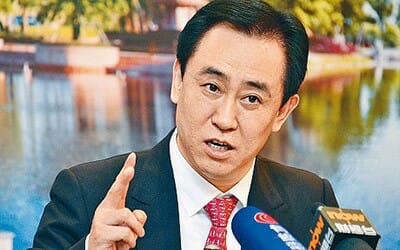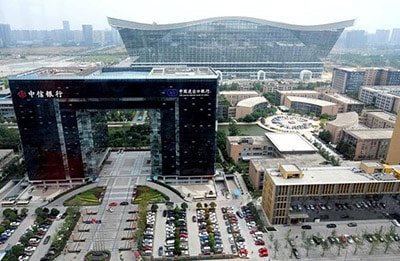
Evergrande’s Xu Jiayin has bet $1.7B on western China real estate in the last 45 days
One of China’s most aggressive real estate developers took a HK$6.5 billion ($839 million) bet on the Chengdu market last week, and promptly saw its decision criticised by credit agency Moody’s Investors Services.
Evergrande Real Estate, which is run by Chinese billionaire Xu Jiayin, took the flak from Moody’s for buying three projects amounting to more than 374,000 square metres of space from Hong Kong’s Evergo Holdings (China).
However, Chengdu is just one of many chances that Evergrande, which is ranked among China’s ten largest developers by sales, has taken in recent months. Besides committing itself to new development projects, the company has jumped into new business lines and expanded its real estate portfolio, despite what many consider to be industry-leading levels of debt.
Negative Outlook for a Top Ten Chinese Developer
Evergrande announced the acquisition of the three Chengdu projects to the Hong Kong stock exchange on Tuesday, saying that the city’s economic fundamental made it an attractive target. Two of the projects are mixed-use, combining office, retail and residential, with the third being purely housing.
The company is acquiring the three properties in the capital of southwestern China’s Sichuan province just one month after it announced that it would spend RMB5.5 billion ($886 million) to take over Starthigh International Limited, a real estate firm in the nearby city of Chongqing.
The developer has been actively raising capital recently as it not only expands its real estate holdings, but also has started up businesses in areas as diverse as bottled water, plastic surgery and cooking oil. In May Evergrande raised $593 million through a share sale to help fund this expansion, and then last month it sold RMB 15 billion ($2.4 billion) in renminbi-denominated bonds on China’s domestic market.
However, despite the financial restructuring Moody’s criticised Evergrande’s latest acquisitions and reconfirmed its negative outlook for the company’s finances.
“Evergrande’s debt leverage will remain elevated with the proposed acquisitions, despite the recent equity issuance,” noted Franco Leung, a Moody’s vice president and senior analyst.
Moody’s said that it expects Evergrande’s debt leverage – as measured by its adjusted debt as a percent of its capitalisation – will trend above 80 percent over the next 12 to 18 months. The rising debt levels are expected to push Evergrande’s debt as a percentage of capitalisation up from its 2014 year-end level of 78.9, which the credit agency cited as being weak for a company with a B1 credit rating.
Moody’s also noted Evergrande’s “notable increase in short-term debt over the last two years.” The developer has been criticised by many financial analysts for its extensive use of perpetual securities to finance its operation. The developer has insisted on classifying these bonds as equity on its balance sheet, in what many see as an attempt to give an inflated view of its financial health.
Chengdu Real Estate Just Evergrande’s Latest Risky Deal
While $839 million in Chengdu projects is a big bet for Evergrande, the acquisitions are just the latest in a series of aggressive deals undertaken by the Guangzhou-based developer.

Evergrande’s Chengdu acquisitions include over 85,000 sqm of retail in one of the world’s most crowded mall markets
In April of this year Evergrande revealed plans to open a new cosmetic surgery business in Hainan province, with the beauty treatments being combined with a tropical resort on Boao island.
The plastic surgery business is part of a new health division that Evergrande announced this year, which is also expected to include the bottled water company that the developer launched in January of last year, as well as new ventures in grain and cooking oil production.
In addition to these startups, Evergrande also purchased New Zealand-based infant formula maker Cowala Dairy last October.
So far, however, these new businesses have proved to be a drag on Evergrande’s bottom line. According to the company’s 2014 financial results, the developer’s non-real estate businesses recorded a loss of RMB 3.13 billion last year, with the bottled water division representing RMB 2.37 billion of those losses.
While the company certainly has more expertise in real estate than in the health care sector, the markets it is buying into could still prove challenging. Despite the recent turnaround in China’s real estate market, the most recent figures for Chengdu show that the city saw housing prices fall by 0.37 percent last month. Chongqing, where Evergrande spent $886 million on Starthigh, suffered a drop of 0.30 percent in housing prices for the same period.
In explaining its ongoing negative outlook for Evergrande’s credit, Moody’s Leung noted that, “The negative outlook also reflects the company’s highly acquisitive appetite to expand its businesses.”
Leave a Reply